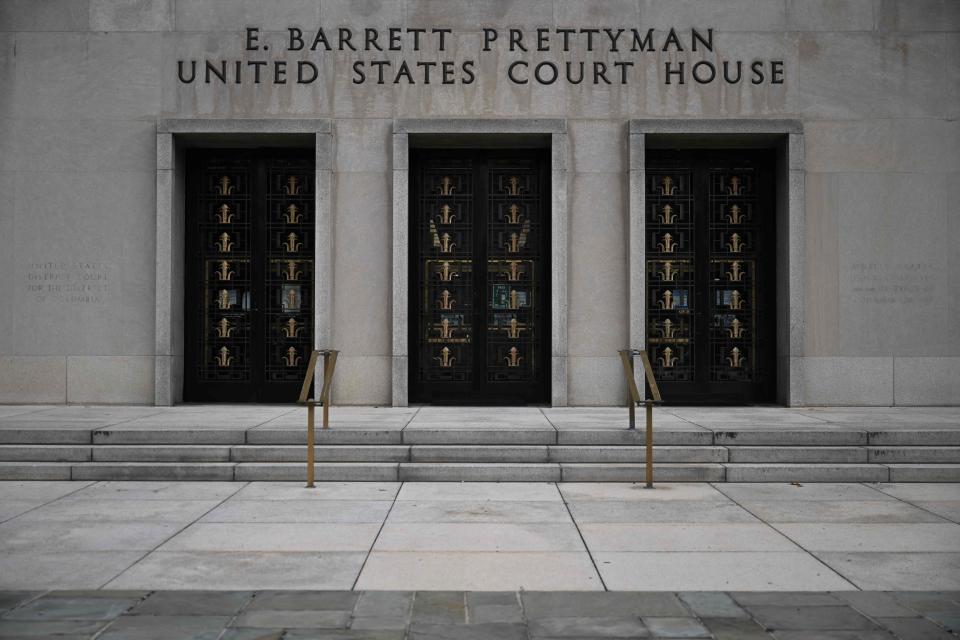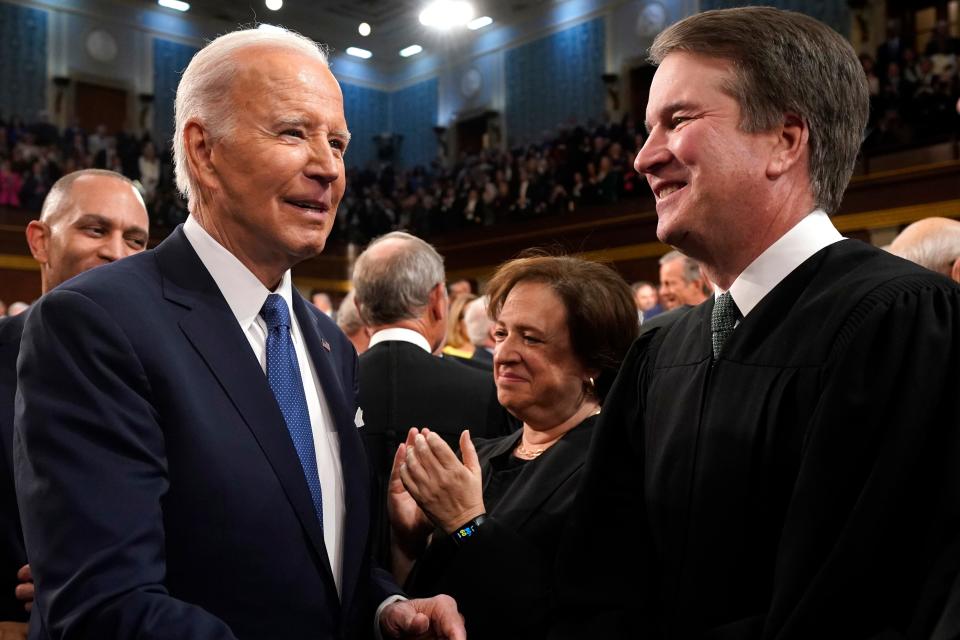Not just Clarence Thomas: Lower courts facing scrutiny over ethics, disclosures, too
- Oops!Something went wrong.Please try again later.
WASHINGTON – By the end of last month, Americans were able to review financial disclosure reports for all nine justices on the Supreme Court − documents that revealed private jet flights, foreign travel and even a bouquet of flowers that Oprah Winfrey had ordered for the newest member of the nation's highest court.
But those annual disclosures are far harder to find for hundreds of lower court judges that make up the bulk of the federal judiciary. At a time when the Supreme Court and the judicial branch are under heightened scrutiny over ethics, federal courts are struggling to honor a law intended to head off potential conflicts.
Fix the Court, a watchdog group that advocates for greater transparency in the judiciary, estimates that only about 17% of the court system's disclosures for 2022 have been posted online, even though most of those reports were due months ago. About 21 of 155 active appeals court judges who were on the bench last year had their 2022 annual financial reports posted to the judiciary's online database as of Saturday, according to a USA TODAY review.
“That means these judges’ board appointments, new debt or new investments from the past three years − any of which might pose a conflict − remain hidden from public view, making oversight nearly impossible,” said Gabe Roth, executive director of Fix the Court. "Effective oversight requires contemporaneous data.”
Lower courts 'fall short' of disclosure requirements
The annual reports, which are also filed by members of Congress, White House staff − including the president − and government agency officials, require the disclosure of investments, gifts and outside income in an effort to reveal potential conflicts of interest. Justice Clarence Thomas, who has been at the center of ethics controversies at the Supreme Court this year, used his most recent report to disclose private jet flights that were paid for by GOP megadonor Harlan Crow.
While some members of the Supreme Court have acknowledged that ethics revelations have become a concern − and the justices appear to be discussing it internally − it's less clear how much attention the issue is receiving in lower courts. U.S. Circuit Judge Lavenski Smith, the chief judge of the U.S. Court of Appeals for the 8th Circuit, told reporters earlier this month that court staff were working "diligently" to make sure the "backlog of past judicial disclosures" was closed but offered no specifics on what actions were taken to address the issue.
Financial disclosures are due May 15. A law signed by President Joe Biden last year requires the reports to be posted online within three months of filing – in other words, by mid-August. But judges may request a three-month extension, which would push the deadline to post the documents until November. It’s not clear how many judges have sought extensions.
All nine Supreme Court justices had their 2022 annual disclosures posted on the court system's website, most of them in June. Two justices − Thomas and Samuel Alito − sought and received extensions. Their reports were made available in late August.
The backlog in reports has caught the attention of a lead sponsor of the new law.
Sen. Chris Coons, D-Del., is "aware of how the current rate of timely financial disclosures falls short of that required" by the law, according to an aide who spoke on the condition of anonymity to speak frankly about the senator's views. Coons, the aide said, is "exploring ways to work with the federal judiciary to ensure the bill is appropriately implemented."
The senator, the aide said, "continues to believe that it’s crucial for those having their day in court −and for all Americans − to have faith in the judicial system and to know about any financial interests of those presiding over cases."
Ethics scrutiny on courts isn't limited to Clarence Thomas
Most of the attention on judicial ethics in recent months has been targeted at Thomas, who accepted luxury travel from Crow and did not report the trips on annual disclosures. Thomas has said the private jet flights and vacations were exempted from disclosure requirements because they were hospitality provided by a friend.
But lower courts have faced criticism over ethics as well.

The legislation requiring the online disclosures, which won broad bipartisan support in Congress, was at least, in part, a response to a Wall Street Journal investigation in 2021 that found more than 130 lower court judges had overseen court cases involving companies in which they or their families owned stock.
Meanwhile, U.S. District Judge Matthew Kacsmaryk, who sits in Texas and who has handed down controversial rulings on the abortion pill mifepristone and, more recently, drag shows, has drawn attention for concealing on his report the name of a company in which he owns at least $5 million in stock. In a statement to CNN in April, Kacsmaryk said court officials "approved the redaction after reviewing the relevant rules and applicable threats."
Related: Flowers from Oprah, travel to Italy: Here's what Supreme Court's new disclosures reveal
Federal judiciary officials have said the biggest issue is a lack of resources needed to parse the reports once they are filed. In its 2024 budget request, the judiciary requested five full-time equivalent positions and $297,000 to support meeting the law’s requirements. Those reports are reviewed for accuracy, completeness and security factors.
Courts struggle with 'additional workload' of new requirements
The courts' administration “processes reports… as quickly as possible, while striving to ensure that reports that are released are complete and accurate and…do not contain information that could endanger the filer or the filer’s family,” said Jackie Koszczuk, a spokesperson for the Administrative Office of the U.S. Courts.

The judiciary, she said, created and posted the database required by the law on time and has “been diligently and continuously processing and uploading judges’ annual and periodic transaction reports to the database.” That, she said, “has resulted in significant additional workload.”
And that, apparently, has also led to delays.
At the New Orleans-based U.S. Court of Appeals for the 5th Circuit, only five active appeals court judges had their disclosures available on the database as of Saturday. That was a better count than many other circuit courts. There were no reports yet available from the San Francisco-based U.S. Court of Appeals for the 9th Circuit as of Saturday.
More: 'Code of conduct:' Elena Kagan calls for new Supreme Court rules amid Clarence Thomas flap
This article originally appeared on USA TODAY: Not just Clarence Thomas: Lower courts face scrutiny over ethics

